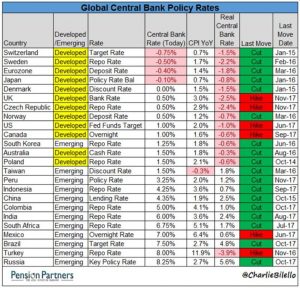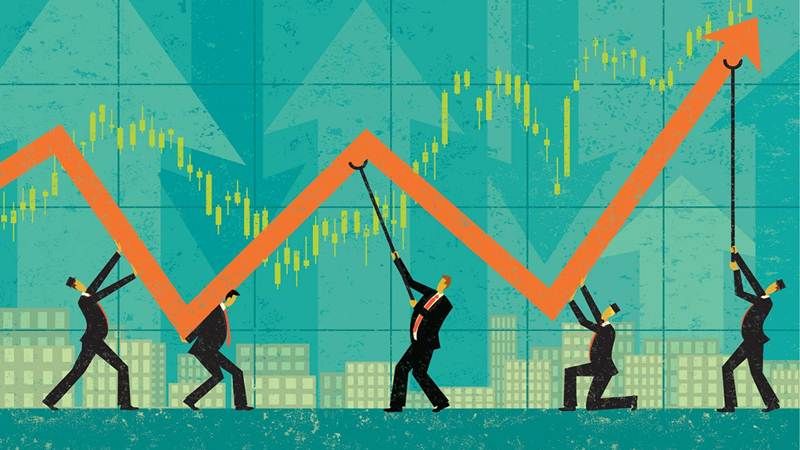http://www.freepressjournal.in/analysis/expect-2018-to-be-more-unsettling-than-2017/1178960
An unsettling 2018
— By | Nov 30, 2017 07:52 am
Most marketmen are a bit confused about what the markets and the leading economies have in store for 2018. The first of such reports is already out. Credit Suisse in its Investment Outlook 2018, which it made public recently, tries to navigate this uncertain territory.
 There is a strong resurgence in risk bonds. As Credit Suisse puts it, “This strong performance of risk assets comes against the backdrop of significant geopolitical tensions, in particular concerning North Korea, but also at a time of policy uncertainty in the United States. Concerns over Europe have decreased as electoral populism has made less progress than anticipated since growth has been better than expected. In spite of these positive trends, we feel that some of the underlying fragilities of the European Union have not been completely remedied. In coming years, the focus must be on consolidating the relatively limited stability that has been achieved. In particular, the European Monetary, Banking and Capital Markets Union must be further strengthened to ensure that growth is sustained and that crisis risks remain contained. Globally, cooperation must be strengthened in security matters – which include the all-important issues of terrorism and cybersecurity – while protectionist trends are resisted.”
There is a strong resurgence in risk bonds. As Credit Suisse puts it, “This strong performance of risk assets comes against the backdrop of significant geopolitical tensions, in particular concerning North Korea, but also at a time of policy uncertainty in the United States. Concerns over Europe have decreased as electoral populism has made less progress than anticipated since growth has been better than expected. In spite of these positive trends, we feel that some of the underlying fragilities of the European Union have not been completely remedied. In coming years, the focus must be on consolidating the relatively limited stability that has been achieved. In particular, the European Monetary, Banking and Capital Markets Union must be further strengthened to ensure that growth is sustained and that crisis risks remain contained. Globally, cooperation must be strengthened in security matters – which include the all-important issues of terrorism and cybersecurity – while protectionist trends are resisted.”
But risks and uncertainty go beyond that. China remains supremely enigmatic. The collapse in the share prices of PetroChina has worried many. Ten years after PetroChina peaked on its first day of trading in Shanghai, the state-owned energy producer has lost about $800 billion of market value last month. In current dollar terms, it’s the world’s biggest-ever wipeout of shareholder wealth. It could get worse. Could this be the fate of other rising stars from China?
If China perplexes, the US has made the world a bit more unsteady, even unsafe. It tacit support to the imprisonment of members of the Saudi royalty, has taken away the sheen of this country’s claim that it stands for the right. Its misadventures in the Middle East and in Afghanistan are legendary. Its willingness to support lies (remember the Nayirah episode who falsely testified before the US Senate? (https://en.wikipedia.org/wiki/Nayirah_testimony) has made it lose the moral authority it once had.
UK is in decline. Except for Germany, much of the EU has members with books that are splashed with red ink.
 In fact, if one looks at Central Bank rates, most developed countries have been offering negative interest rates eight years since the financial meltdown. Take a check.
In fact, if one looks at Central Bank rates, most developed countries have been offering negative interest rates eight years since the financial meltdown. Take a check.
- Switzerland’s central bank rate was minus 0.75%. Since inflation is around 0.7%, it means a negative interest rate of 1.5%.
- Sweden — Its central bank rates are at around minus 0.5%.. With inflation hovering at around 1.7%, its real interest rates are a negative 2.2%.
- Eurozone — Central bank rate: minus 0.4%, effective real interest rates a negative 1.8%.
- Japan – minus 0.1; inflation 0,7%, real interest rates= -0.8%.
- UK — central bank rate 0.5%; inflation 3%, effective real interest rates -2.5%.
- Even the US has been offering effective negative real interest rates — central bank rate 1%; inflation 2%; effective real interest rates -1%.
Not surprisingly, yields on bonds are low. The only places where they will be high will be where countries could pose greater risks. Thus, the highest rates – as always – will come from riskier assets, namely equity markets. And the gap between bond markets and equity markets is not very comforting (see chart).
It is like the the nightmare that William Butler Yeats once envisaged where “The best lack all conviction, while the worst are full of passionate intensity”.
Moreover, there is a possibility that equity markets will also remain turbulent. Many companies are likely to be hit by disruptions. The automobile industry is already under threat from electric vehicles. The latest Tesla offering of trucks that can travel up to 800 km on a single charge has shaken up almost everybody. Most people believe that the technology that Tesla may be using may not even relate to cobalt or lithium, but may involve new materials, possibly new metals.
Then there is the disruption in the energy sector (http://www.asiaconverge.com/2017/10/solar-power-couldtrigger-employment-generation/). Yes, if proper policies are put into place, this sector alone could create as many as 83 million jobs within 2-3 years. More importantly, solar power could work synergistically with electric vehicles (and water desalination).
Nitin Gadkari, Union minister for roads and highways (in addition to ports, waterways, and clean Ganga) has stated that he would like to see all hydrocarbon vehicles off the road by 2030, and herald the introduction of electric vehicles. Likewise, Piyush Goyal, Union minister for railways, has already announced that he will phase out diesel engines in favour of electric ones. This is much in line what noted disruption guru Tony Seba has been saying (https://www.youtube.com/watch?v=2b3ttqYDwF0).
That could mean reduced demand for steel, oil and auto components. Remember, an electric vehicle uses only 200 moving parts compared to conventional vehicles which use 2000. Investors in these sectors could get their fingers burnt.
Thus, while it is true that equity markets continue hold out the most attractive returns, they will also be witness to innumerable casualties as well.
In other words, welcome to a turbulent 2018.





































COMMENTS